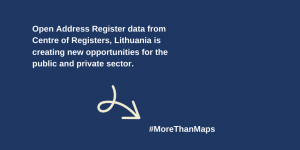Centre of Registers, Lithuania
“Having assessed the economic and social benefits of open data and taken further steps towards openness, renewal and change, we have opened the Address Register data to the public. It is a tool for the public and private sectors to improve their services and deliver them more efficiently, to develop new, high value-added products and to contribute to the progress of all of us.”
Saulius Urbanavičius, Director General, Centre of Registers, Lithuania
In October 2020, all data in the Lithuanian Address Register were opened to the public to use for free - a total of 2.1 million unique addresses and more than 1 million address points that can be marked on the map. As a result, public and private sector organisations can use a single standard of address information in their systems and ensure smooth data exchange.
The Address Register was created in 2004 and contains textual and spatial data on the following Register objects: counties, municipalities, wards, residential areas, streets, addresses and names given to a building, structure or other object. Address and street data is provided to the Address Register using an address allocation application. The whole process of registering, changing or annulling an address or street takes place in the electronic environment. In 2020, 50,037 addresses and 1,406 streets were registered. In addition, the boundaries of residential areas, wards, municipalities and counties are constantly updated.
Benefits
- Enables the smooth exchange of data using a single address standard.
- Integrates with other state registers and information systems to enable real-time use of spatial and textual data, thereby avoiding mistakes and saving time and money for all participants.
- Supports a wide range of activities including planning of services and logistics, operational and emergency services, delivery of tax notices, goods, postal and courier services.
- Encourages and supports development of new products based on open address data, for example a geographic search algorithm which allows searches for geographical location by address, place name, name of organisations or other keywords.

